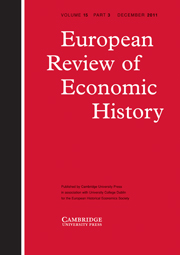Article contents
Social capital and economic performance: trust and distrust in eighteenth-century gold shipments from Brazil
Published online by Cambridge University Press: 13 December 2010
Abstract
This article discusses agency problems in a period of market boom. It takes Portuguese trade with Brazil as a case study to discuss the impact of colonial market expansion on social capital. The hypothesis is that social capital depletion prompted an uneven distribution of information and a limited access to honest individuals, who might afford a premium to certain forms of agency. Given the states' inability to provide legal sanctioning in colonial regions, this article focuses on private-order mechanisms which were effective for selecting reputable individuals. The exploration of network analysis identifies the mechanism that responds to such an adverse environment and supports the argument that business organizations which counted on the geographical mobility of agents had comparative advantages. The approach followed in this article brings new insights on informal institutional arrangements and on itinerancy in contexts of low levels of social capital.
- Type
- Research Article
- Information
- Copyright
- Copyright © European Historical Economics Society 2010
References
- 7
- Cited by


